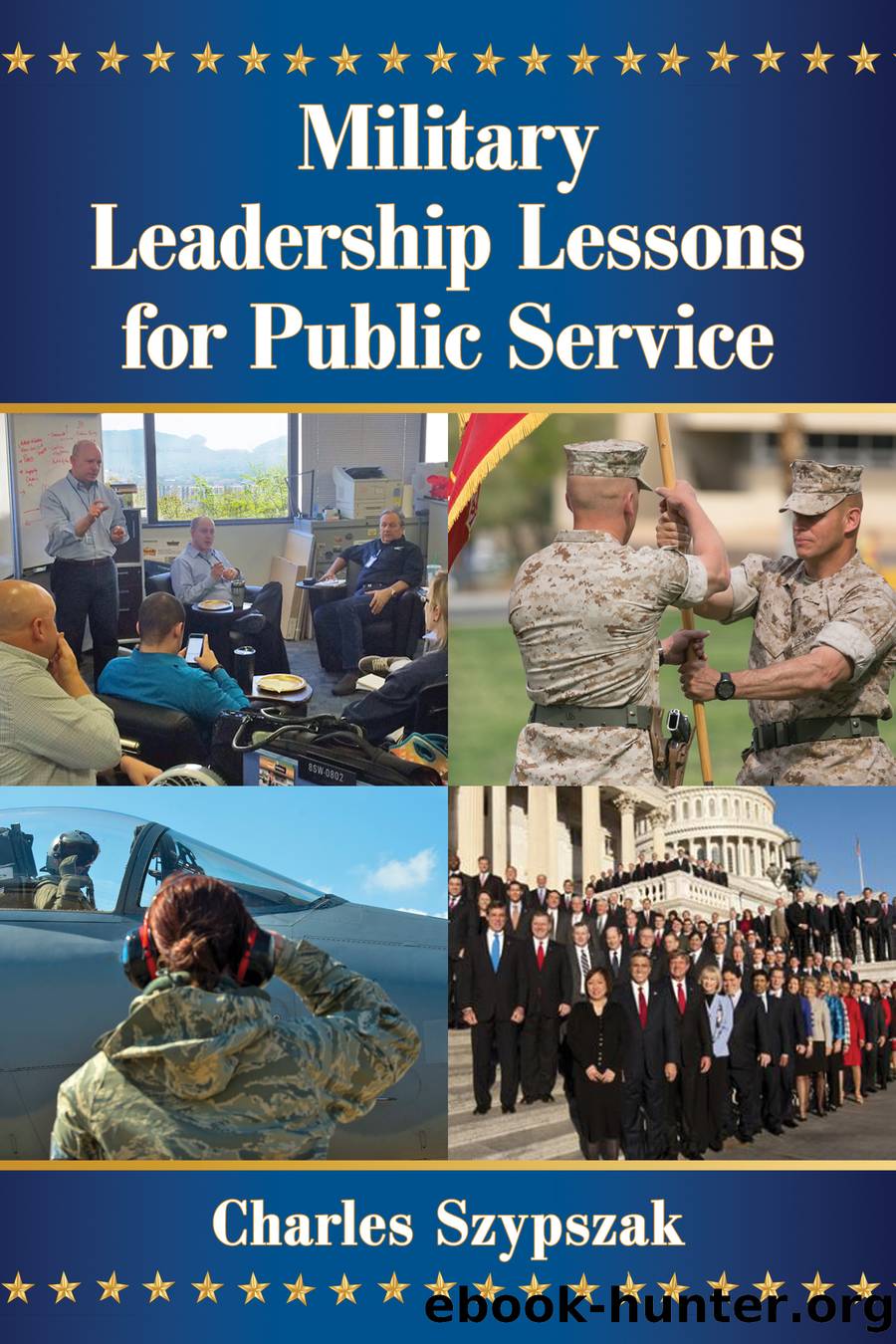Military Leadership Lessons for Public Service by Charles Szypszak

Author:Charles Szypszak
Language: eng
Format: epub
Publisher: McFarland & Company, Inc., Publishers
Published: 2016-10-06T00:00:00+00:00
Learning Leadership Across the Gap
Academics achieve success in their fields by being distinctive. To get their credentials they must produce a lengthy dissertation that makes an âoriginal contribution to scholarship.â For notoriety they must publish and speak about findings that upset conventional ways of thinking. There is little prestige in academics for speaking an old truth. Unsurprisingly since the 1970s public service scholars, coming to age in an environment in which the dominant view protested the militaryâs influence in society, have written and taught about leadership in a way that belies the idea that military experience is transferrable to other fields of public service.
Meanwhile in their segregated sphere the military has continued to refine its approach to defining and developing effective leadership. The refinements incorporate new learning about human behavior, the changing nature of service in an increasingly global and technologically oriented world, and the diverse responsibilities with which military leaders are now charged by civilian leaders. Much of this evolution mirrors change in public service. In fact in important ways roles are intertwining or even crossing over; military leaders are increasingly involved in such traditionally civil functions as emergency relief and local government administration, and civil administrators must prepare for terrorist attacks, combat gang warfare, and respond to failures in vital infrastructure.
Change requires refinement but not necessarily abandonment. The military must understand this as it seeks to incorporate its centuries of experience from which proven principles have emerged as guideposts for difficult decision making and personal development in todayâs world. Experience, old and recent, should similarly be incorporated into the education of public service leaders. But based on what most public administrators are likely to see, which rarely involves exposure to the militaryâs approaches, they have little reason to believe that they too can benefit from this learning. Veterans of the military, many of whom have applied the approach in diverse circumstances, are likely to be told that they should leave their learning and experience at the base gate. Instead they will be immersed in a prevailing view that military leadership is alien to other public organizations and there is nothing to learn from it. As a consequence, in practice everyone is left with no real reference point for making hard leadership decisions or dealing with difficult leadership situations. In its place they are told in various ways about the need for self-reflection and the importance of supportive relationships and promoting social change. While there is value in these lessons, they do not equip leaders for making decisions to influence real people to accomplish the organizational mission.
Those who are entering public service without a military background should not be assumed to be unwelcoming of any rich source of leadership guidance. If given the opportunity to consider the reality of military leadership principles and experience they can see their value. The author witnessed a resounding example of this with an elective course he taught in a master of public service program: Military Leadership and Public Administration. The topics included a
Download
This site does not store any files on its server. We only index and link to content provided by other sites. Please contact the content providers to delete copyright contents if any and email us, we'll remove relevant links or contents immediately.
| Civil War | Operation Desert Storm |
| Veterans | Vietnam War |
The Radium Girls by Kate Moore(12013)
100 Deadly Skills by Clint Emerson(4914)
Rise and Kill First by Ronen Bergman(4776)
The Templars by Dan Jones(4681)
The Doomsday Machine by Daniel Ellsberg(4482)
The Rape of Nanking by Iris Chang(4200)
Killing England by Bill O'Reilly(3994)
Stalin by Stephen Kotkin(3956)
Hitler in Los Angeles by Steven J. Ross(3937)
12 Strong by Doug Stanton(3541)
Hitler's Monsters by Eric Kurlander(3327)
Blood and Sand by Alex Von Tunzelmann(3192)
The Code Book by Simon Singh(3175)
Darkest Hour by Anthony McCarten(3117)
The Art of War Visualized by Jessica Hagy(3000)
Hitler's Flying Saucers: A Guide to German Flying Discs of the Second World War by Stevens Henry(2744)
Babylon's Ark by Lawrence Anthony(2671)
The Second World Wars by Victor Davis Hanson(2521)
Tobruk by Peter Fitzsimons(2503)
